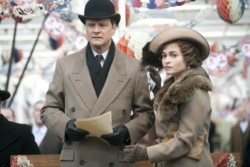In our Darkest Hour: Why are biopics so successful?
Life doesn’t make narrative sense. It’s a confusing mess in which you are your own main character and simultaneously an extra or supporting role in the lives of others, too. And yet there are films that attempt to present real-lives whilst also making narrative sense. These films are broadly characterised as biopics: films dedicated to presenting the life of a person of social or political significance, someone with enough celebrity-status, or more often, an interesting event that has happened to someone in their life. Usually, these biopic films profit around awards season, when critics are looking for emotional and educational films to praise. And coming into 2018 is Darkest Hour, a film concentrating on one of the most (arguably too much so) revered Winston Churchill and his struggles in preparing Britain in the early days of World War II.

Dunkirk has also done well with multiple award nominations. Image credit: Flickr
Before going into biopics in general, it is worth examining why the Darkest Hour in particular was made. Well, World War II remains a goldmine for dramas and war films to be based around with the most recent success being Dunkirk last year, providing a captivating cinematic experience, albeit one which does the opposite of Darkest Hour – focusing not on character but situation to make the audiences feel they were in the midst of a relatively overlooked historical incident.
Making a biopic on Churchill is also a safe choice for a film company to make. He is one of the most revered icons in British history, the man who refused to surrender making him an inspirational figure with conflict to follow and a recognisable face for audiences to empathise with. All that is needed to sell the film is to choose the right part of Churchill’s life (early World War II), cast a well-known actor like Gary Oldman, and you have a film which is likely do well at the box office. Darkest Hour has already won over critics, being nominated for ‘Best Composer’ and ‘Best Picture’ at the Critics’ Choice Awards this year as well as winning ‘Best Make-up’ and ‘Best Actor’. But looking beyond this latest film, why are we so captivated by stories about real people’s lives?
One of the reasons is the central performance. A biopic is demanding, it’s one thing to play a character, it’s another to become someone else with a performance that isn’t a caricature but something which completely suspends our disbelief and makes us believe for the duration that we are not seeing an actor, but an actual historical figure. This is incredibly difficult but the actors who pull it off often find these roles to be their career high points. Colin Firth in The King’s Speech, Helen Mirren as the Queen, and Daniel Day-Lewis as Lincoln to name but a few. Great care is found in the casting of biopics as the filmmakers know that the central performance is the ‘make-or-break’ factor for these films. If it doesn’t work and the performance is seen as middling such as Sam Riley’s performance as a Joy Division singer, Ian Curtis in Control, or outright condemned as Naomi Watts was in Diana then nobody will want to see it.
Biopic film profit around awards season, when critics are looking for emotional and educational films to praise
But it is more than a performance. Biopics are often condensed, inspirational stories that give our protagonists goals which they achieve, often editing to focus solely around those accomplishments. The King’s Speech is a story of overcoming disability which we can all connect to even though our hero is royalty, Elizabeth the Golden Age is a woman overcoming obstacles of all kinds and rising above them to become a legendary historical figure.
And on the flipside, there are stories concerning people who otherwise would remain in historical obscurity and audiences can find pathos and sympathy for. Ed Wood for instance details the tragic life of an aspiring film director who loved his craft and yet didn’t have the talent or money to translate it into a successful reality, making it a precursor to 2017’s hit success The Disaster Artist, the only difference being that Ed Wood died in obscurity and poverty while Tommy Wisseau is able to enjoy the unusual success of his questionable art.
A biopic is demanding, it’s one thing to play a character, it’s another to become someone else with a performance that isn’t a caricature
No matter who the film concerns, audiences frequently know what to expect as biopics often demand that the rest of the filmmaking should complement the main performance and story, rather than stand out. Cinematography is often subtle, there is usually a key episode to be focused on which the film can use as its climax, and often the films will end on either a high-point or the actual death of our historical figure depending on what tone the overall work is going for.

Colin Firth was highly praised for his portrayal of King George in The King’s Speech. Image credit: Wikimedia Commons
So, having discussed why we go to see biopics, it’s worth pointing out that they can often be extremely controversial. Eddie Redmayne’s casting in The Danish Girl sparked a debate over the value of superstar recognition against fair representation. They can make waves on important topics like Dallas Buyers Club, which provoked questions about the ineffectiveness of Government during the Aids crisis. And sometimes they can be Darkest Hour, a film which chooses the safe confines of a safe piece of history and doesn’t explore the less flattering before-and-after the war aspects of Churchill’s life.
Audiences frequently know what to expect as biopics often demand that the rest of the filmmaking should complement the main performance and story, rather than stand out.
What the success of both controversial and safe options show is that the biopic is like any other genre. Sometimes we just want an inspirational simple narrative about overcoming odds and sometimes we want to be genuinely challenged, with time, maybe Churchill will face a similar scrutiny, but that hour’s yet to come. In the end, looking at biopics, we enjoy these films because they narrow the focus down, allowing us to grip to one person’s struggles and endeavours. Sometimes they fail in achieving the right tone or performance, and sometimes they are defining examples of cinema that show the best kinds of stories are ones written by our own lives.
No matter what we’ll keep coming back to biopics, because watching a life that makes a strange kind of narrative sense is reassuring, because our own lives don’t. They remind the audience that they are the main character too, the film about us just hasn’t been made yet.

Comments